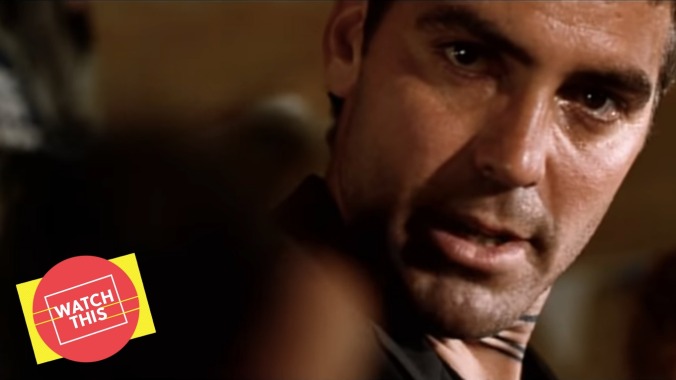Quentin Tarantino and Robert Rodriguez first joined forces in the fun, gory From Dusk Till Dawn

Watch This offers movie recommendations inspired by new releases, premieres, current events, or occasionally just our own inscrutable whims. This week: Morbius has been pushed back to 2021, but you don’t have to wait that long to check out these other vampire chronicles and bloodsucker tales.
From Dusk Till Dawn (1996)
About an hour into From Dusk Till Dawn, Jacob Fuller (Harvey Keitel) wards off a group of marauding vampires by fashioning a cross from a baseball bat and a shotgun, both of which he grabs from behind the bar at a sleazy dive. As he backs away toward safety, Jacob occasionally uses the bat to fire and re-cock the gun, blasting creatures into oblivion with his makeshift crucifix. In other words, this is a vampire movie directed by Robert Rodriguez.
Rodriguez was not the star attraction of From Dusk Till Dawn upon its January 1996 release. The movie was received as a zenith of middle-to-bottom-drawer Quentin Tarantino projects that tried to capitalize on the success of Pulp Fiction without actually following it up directly. It’s got everything: Two guys pointing their guns at the camera; criminals using familiar Tarantino phrases (“Be cool”); a shot positioned from the inside of a trunk. Perhaps most importantly, it has Tarantino casting himself in a prominent role that’s half self-deprecating (he plays a loathsome rapist and murderer who gets punched out by George Clooney), half self-glorifying (he still gets to shoot people and have Salma Hayek stick her foot in his mouth). The movie comes by its cheap-knockoff roots honestly: The script was Tarantino’s first paid assignment (commissioned to flesh out an idea from producer and effects whiz Robert Kurtzman), and became one of several collaborations with his buddy and fellow grindhouse enthusiast Rodriguez, who agreed to direct.
The result is a stranger and more direct hybridization of the two filmmakers’ styles, which have more often been juxtaposed in anthology-style projects like Four Rooms and Grindhouse. The first half-and-change of the movie is a nasty second-tier Tarantino crime movie, following career criminal Seth Gecko (Clooney) and his psychotic little brother, Richie (Tarantino), as they flee Texas for Mexico, leaving a trail of bodies in their wake and kidnapping a family (Keitel, Juliette Lewis, and Ernest Liu) to help sneak them across the border. Rodriguez repeatedly apes his collaborator’s more deliberate directorial style before the movie’s turning point, where the characters arrive at a “biker and trucker” bar, replete with strippers and pyro, that turns out to be a nest of vampires. At this point—or a little earlier, when it becomes clear that Cheech Marin will play multiple roles—the Rodriguez sensibility takes over: Weapons are forged, elaborate kills are prioritized, and the horror is chased with gruesome sight gags.
Rodriguez and Tarantino’s primary contribution to vampire lore is to give the beasts squishier bodies, making them easier to stake and dismember. They’re effectively craftier zombies, with mythology played fast and loose. When the survivors plot their next move and one questions whether any of them have read a “real book” on vampires or are (in classic Tarantino fashion) mostly going by what they know from movies, a biker dude named Sex Machine (makeup guru Tom Savini) asks, in all earnestness, “Like a Time Life book?”
Other bits of QT dialogue enliven the proceedings, but the real Tarantino advantage is the caliber of actors and bit players attracted to a throwaway project. The popular narrative is that Clooney didn’t become much of a movie actor until Steven Soderbergh tamped down his tics and mannerisms in Out Of Sight, and while his go-to head bobs, tilts, and sarcastic smiles are all present and accounted for here, he’s still a commanding presence with a good handle on Tarantino dialogue. The MVP, though, is Keitel. His Jacob is a dusty cliché, a “faithless preacher,” as Seth calls him, who is forced to reconnect with his spirituality in an extreme situation; he also becomes a grounding presence in both the tense standoffs of the first hour and the splatter-y blowout of the second. He reads Tarantino dialogue somewhere between a purr and a growl, radiating warmth and practicality. Due respect to Mr. White and The Wolf, but it might be his best Tarantino-related performance.
From Dusk Till Dawn admittedly doesn’t add up to anything of real substance. (It advertised as much with a cheeky, then-current tagline: “Vampires. No interviews.”) That’s what ultimately makes it a Rodriguez genre exercise more than a Tarantino film—and one of the former’s best. If it has any message, it’s a genre-appropriate one that dismisses the romance and tragedy often ascribed to vampires: Sometimes the real triumph is just making it through the night.
Availability: From Dusk Till Dawn is currently streaming on HBO Max. It’s also available for rental or purchase on Amazon, Google Play, iTunes, YouTube, Microsoft, Fandango, Redbox, AMC, and VUDU.